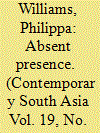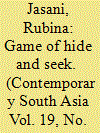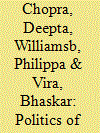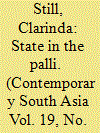|
|
|
Sort Order |
|
|
|
Items / Page
|
|
|
|
|
|
|
| Srl | Item |
| 1 |
ID:
107221


|
|
|
|
|
| Publication |
2011.
|
| Summary/Abstract |
This paper examines the everyday experiences and perspectives of Muslim Ansa-ris (weavers) in urban north India with respect to the 'welfare state'. The case of a recent health insurance scheme, initiated by the Indian government, constitutes the paper's focus. Narratives around the scheme expressed by residents in a majority Muslim mohalla- (neighbourhood) in Varanasi illustrate the ways in which the state's presence was more often experienced through its perceived absence and inaccessibility. But even whilst such experiences represented broader patterns of neglect, locally interpreted as the upshot of being India's largest religious minority, this community was not stricken by a sense of absolute alienation and nor did individual or collective actions exhibit outright disaffection towards the state. More appropriately, 'defensive agencies' informed by degrees of pragmatism, acceptance and resilience, were articulated in an effort to protect, as well as improve the future capacities and ambitions of the neighbourhood residents where the state had seemingly failed. The paper concludes however with a word of caution about celebrating such agency, and reflects on the potential for transformative politics by Muslims in urban India.
|
|
|
|
|
|
|
|
|
|
|
|
|
|
|
|
| 2 |
ID:
107223


|
|
|
|
|
| Publication |
2011.
|
| Summary/Abstract |
This paper examines perceptions of the state by urban Muslim artisans in India. Through ethnographic analysis, I focus on the life and work trajectories of two artisans whose perceptions and experiences of the state differ widely. The common thread running through each artisan's experience is that their engagement or disengagement with the state produces subjectivities that are both deemed authentic. One artisan's involvement with the state serves to authenticate not only her skills and craftsmanship but also her sense of self, while another artisan's refusal to engage with the state authenticates his work and sense of self because of his experience of the state as corrupt. I am particularly interested in how state-issued documents, such as the certificate conferred to winners of the national awards for highly skilled artisans and the artisan identification card, are perceived as legitimate or illegitimate based on ideals of what it means to be an authentic artisan. This paper also examines how conceptualizations of the margins through the medium of documents can provide alternate ways of understanding experiences of the state.
|
|
|
|
|
|
|
|
|
|
|
|
|
|
|
|
| 3 |
ID:
107224


|
|
|
|
|
| Publication |
2011.
|
| Summary/Abstract |
This paper examines perceptions of the state by urban Muslim artisans in India. Through ethnographic analysis, I focus on the life and work trajectories of two artisans whose perceptions and experiences of the state differ widely. The common thread running through each artisan's experience is that their engagement or disengagement with the state produces subjectivities that are both deemed authentic. One artisan's involvement with the state serves to authenticate not only her skills and craftsmanship but also her sense of self, while another artisan's refusal to engage with the state authenticates his work and sense of self because of his experience of the state as corrupt. I am particularly interested in how state-issued documents, such as the certificate conferred to winners of the national awards for highly skilled artisans and the artisan identification card, are perceived as legitimate or illegitimate based on ideals of what it means to be an authentic artisan. This paper also examines how conceptualizations of the margins through the medium of documents can provide alternate ways of understanding experiences of the state.
|
|
|
|
|
|
|
|
|
|
|
|
|
|
|
|
| 4 |
ID:
107219


|
|
|
|
|
| Publication |
2011.
|
| Summary/Abstract |
This paper analyses the gendered experience of the state for the Muslim survivors of violence in Gujarat in 2002. Most of the scholarship on the working of the state after communal violence in post-independence India concentrates on the anxiety to re-instate the 'myth of the state', through policies that establish its respectability after violence. The emphasis is on understanding the mechanics of the state, its 'order making' function. Very little attention has been paid to understanding the lived experience of the modern state from a gendered perspective. What studies there have been tend to focus on the internal power structures within nationalist discourses, the patriarchal nature of state assertion, and point to forgotten narratives within the meta-narratives of violence and suffering. There is very little evidence examining how men and women experienced the same process differently, or how they make sense of their experiences, in a context where the lines between order and chaos, legitimacy and illegitimacy and trust and betrayal were constantly being redrawn. In examining memories of loss and suffering, this paper shows the contrasting and shifting ways in which the state is experienced, imagined and granted legitimacy by men and women from the margins.
|
|
|
|
|
|
|
|
|
|
|
|
|
|
|
|
| 5 |
ID:
107218


|
|
|
|
|
| Publication |
2011.
|
| Summary/Abstract |
This introduction discusses the articles in this Special Issue, which are all focused on exploring the everyday interactions between marginalised individuals and groups and the state in contemporary India. In particular the articles highlight the experiences of a diverse set of marginalised groups - Muslim artisans and weavers, Dalits, Tibetan exiles and post-conflict victims in Gujarat - in order to work towards an understanding of the politics of citizenship from the margins. Across these articles two interlocking themes emerge. Firstly, how different marginalised groups have experienced, critiqued and engaged with different aspects of the `welfare state'. Secondly, the way in which agencies were articulated from the margins through these processes of engagement, shaping and recasting interactions between the state and society in India. We argue that the deployment of different strategies of engagement with the state by India's marginalised can be viewed as a politics of citizenship, through which marginalised people (re)make themselves as citizens. This essay is thus a call for future research on citizenship as a lived experience which is operationalised in local practices and quotidian interactions between the state and society.
|
|
|
|
|
|
|
|
|
|
|
|
|
|
|
|
| 6 |
ID:
107226


|
|
|
|
|
| Publication |
2011.
|
| Summary/Abstract |
In this paper I examine Dalit attitudes towards the state in Andhra Pradesh. In this part of India, Dalit lives and physical surroundings are quite literally shaped by the state and encounters with state officials in various guises are frequent. I argue that Dalits' dealings with the state have led them to a view which is essentially pragmatic: they see the state in terms of what they can extract from it. While their experiences with local bureaucracy are often frustrating and sometimes humiliating, they nevertheless regard the state as a resource which potentially can be tapped for their advance. Indeed, in light of the disintegration of patronage and heightened caste conflict, they are forced to turn to the state for assistance. The conflict between the two major Dalit castes themselves and between Dalits and the dominant castes over reservations also shows how central state resources are to Dalits' sense of identity. Contrary to much of the literature, then, I suggest that many of the most marginalised believe the state can assist their advance and demand that their political representatives harness state power to work in their interests.
|
|
|
|
|
|
|
|
|
|
|
|
|
|
|
|
| 7 |
ID:
107225


|
|
|
|
|
| Publication |
2011.
|
| Summary/Abstract |
Exiled Tibetans in India are an unusual marginalised community. With their own government structure operating within the sovereign state of India, albeit without legal recognition, they are both de facto refugees from the perspective of the Indian state and Tibetan 'citizens' in the eyes of the Tibetan government-in-exile (TGiE). Based on ethnographic fieldwork, this paper examines the complex, dynamic and at times contradictory three-way relationship between this population and the two 'governments' which strive to identify, document and rehabilitate them. After sketching out the context of relations between India and (exile) Tibet, these interactions are explored through two key sets of state-population relations: the identification of individuals as citizens and refugees, and the provision of welfare. Interweaving 'top-down' and 'bottom-up' perspectives on such state-citizen and state-state relations, this paper juxtaposes the rhetoric of both 'governments' with Tibetan citizens' micro-political interactions with these state structures and foregrounds the importance of scale for analyses of the state. The paper concludes by reflecting on how this case can offer a critical spotlight on broader understandings of the everyday state. It is argued that this case provides particularly valuable leverage in demonstrating the partial and processual nature of statehood and powerfully exposes the contingent practices which underlie the social construction of political power in so-called 'normal' states.
|
|
|
|
|
|
|
|
|
|
|
|
|
|
|
|
|
|
|
|
|